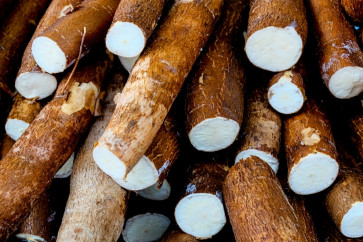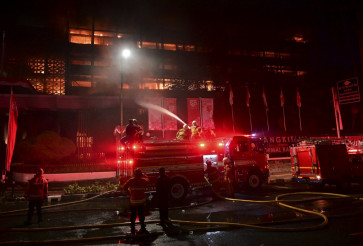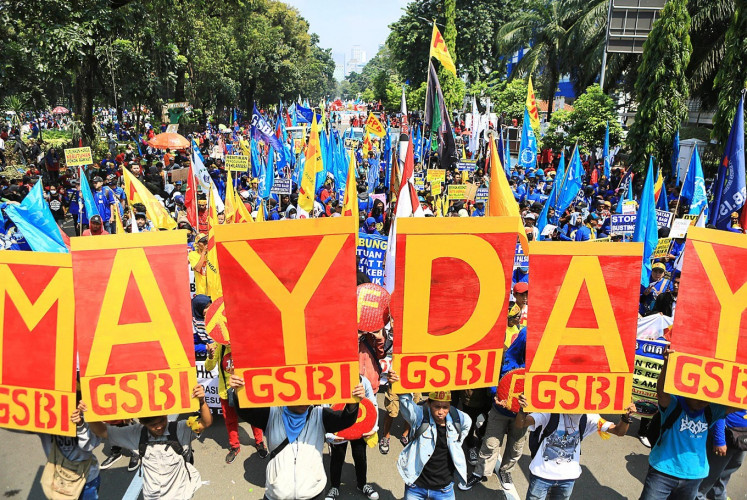A brush with the other side at Gunung Kawi
"Your Honor, I'm just here for some sightseeing
Change text size
Gift Premium Articles
to Anyone

"Your Honor, I'm just here for some sightseeing. I don't really have that much money for tobacco."
I barely managed to gasp the words while I struggled to keep my thoughts together and not be distracted by the mystifying atmosphere that pervaded the poorly lit room in a pavilion at Gunung Kawi, a popular spiritual tourist destination in East Java.
The center, located at the foot of Mt Kawi, has for decades attracted crowds eager for the advice of soothsayers, especially in times of economic and political uncertainty, such as now. Such knowledge seekers eagerly fall into the embrace of fortune tellers, while matchmakers provide welcome advice to those seeking a life partner and mystics contribute to maintaining the allure Gunung Kawi holds for people from all ethnic groups and faiths.
The power of Gunung Kawi is based on a personality cult that revolves around two legendary figures, popularly known as Mbah Djoego and Mbah Sujono. The two, who died some 200 years ago, are regarded as both saints and heroes.
After the tour guide ushered me into the dimly lit pavilion, I was asked to kneel on the floor facing a traditional bed that was draped with a mosquito net and covered with a cotton white blanket.
Two elderly men in Javanese garb stood at each side of the bed waving their fans as if to provide cool air to an invisible person sitting on the bed. A third man sat nearby behind a low desk and a fourth acted as speaker.
The smell of burning incense, the low light, and the somber elderly men in dark clothing combined to heighten the mystical atmosphere. As I struggled to stay with it and not be distracted by the whole setup, let alone the incantation of prayers and mantras, I heard a voice explain that the man sitting on the bed was the honorable Mbah Djoego. To please the legendary man, all that is needed is tobacco, for which a donation of Rp 360,000 would suffice.
Even as I tried to keep my composure, it flashed through my rebellious mind that His Honor must have consumed tons of tobacco through the decades yet he still couldn't get enough of it. And before I was aware of it, I heard myself saying, "I am here only for sightseeing. I can give you only Rp 5,000 at the most."
My clumsy utterance was met with a barrage of muffled words, a show of embarrassment and indignation on the part of the four men. Clearly, it was the first time they had met such an ignorant and despicable visitor, who dared to try to bargain over the tobacco money.
Seeing that it was impossible to deal with this ignorant traveler, one of the men told me to hand over the money in exchange for a packet of flowers for scented water.
My visit to that dimly lit room lasted only some 5 or 10 minutes, but it felt like an eternity. Never before had I felt so relieved to be able to breathe in the open air again.
The pavilion that I stumbled out of is bordered by a small footpath and is surrounded by open-sided halls for devotees to gather or conduct prayers. Two plaques at the entrance state that Kanjeng Kiayi Zakaria, or Mbah Eyang Djoego, and Mbah Eyang Imam Sujono are both members of the Yogyakarta court. They were followers of Pangeran Diponegoro during the tumultuous years of 1825-1830 in Central Java. Both prominent figures were known to have taken refuge at Gunung Kawi to evade the colonial army.
Since then, people have continued to pray at their graves and their descendants keep the pair's legendary status alive.
The guide who ushered me through a maze of alleys said he had served as a guide there since he was a boy. He walks in his father's and grandfather's footsteps and is quite content with the life he has chosen, he assured me.
He remains optimistic that the allure of Gunung Kawi will last forever. He too directed me to buy flowers for scented water and guided me to a water source where I could wash my hands and face; he also reminded me to say a prayer for a good life and future fortune.
These are the rituals that every visitor must follow before visiting the pavilion of Mbah Djoego or his grave.
The tourist arrivals usually peak with religious festivals in the Javanese calendar. Jumat Kliwon (the Friday coinciding with Kliwon, one of the five market days in the Javanese calendar) is also regarded as an auspicious day for conducting prayers and visiting the gravesites of the two legends.
The hotels within the premises of the pilgrimage site as well as those lining the corridor leading to the entrance gate are, at such times, fully booked. Stalls selling food, flowers, amulets and souvenirs enjoy brisk business, and Chinese prayer houses also have plenty of visitors.
On learning that I did not make the requested donation for tobacco money, my guide kindly reminded me that I could still do so as there were ATMs for withdrawing money. He reminded me that I still had a chance to make a fortune while I was there. To convince me of the rewards that might await, he pointed to the facilities in the area, saying that they and the paved stairways had been paid for by those who had become rich after making a donation. I did not budge, but welcomed his stories of his experience and other aspects of the site.
Unsurprisingly, I was glad when the visit to this touristy center with its many spiritual symbols came to an end, and descended the commerce-lined stairs with relief.
But something interesting caught my eye at a bend in the road: Two girls sat chatting and giggling near a heap of sweet potatoes outside their parents' house.
"It's Rp 5,000 per bunch," one called, seeing me looking.
The sweet potatoes of Gunung Kawi are a good treat as they are sweet and have less moisture than those grown in West Java, where the soil is too wet. I agreed on the price but requested they pose for a picture as well, to which they agreed with a giggle.
I still managed to make the last bus to Malang, and on the trip I suddenly remembered the packet of flowers handed to me in the pavilion.
I opened the musty brown packet, looked at the withered flowers distorted by fungus and immediately tossed the lot away into the gutter. Somehow that brought me my final relief, having freed myself of any association with the place.









